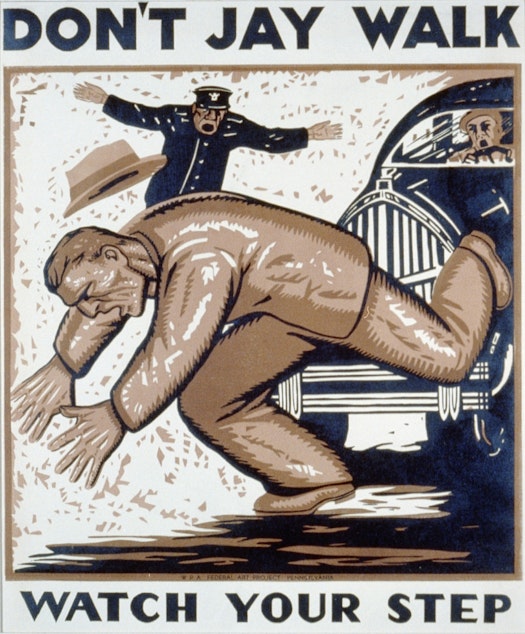Legalizing jaywalking to reduce enforcement inequities considered at Washington statehouse
 1 of 2Police would write no more tickets for jaywalking if the Washington Legislature overcomes skepticism about a pending legalization proposal.
1 of 2Police would write no more tickets for jaywalking if the Washington Legislature overcomes skepticism about a pending legalization proposal.Racial and social justice advocates asked Washington legislators Wednesday to repeal laws against jaywalking. However, a bill to do that generated lots of skeptical questions during a state House committee hearing and its prospects are unclear.
The advocates who want to legalize jaywalking provided data to show that Black people and people who were poor or homeless received a grossly disproportionate share of citations. Police and traffic safety agency representatives countered with predictions that repealing laws against jaywalking would surely lead to more collisions and injuries.
Paula Sardinas, who lobbies for the Washington Build Back Black Alliance, told the Washington House Transportation Committee that jaywalking enforcement was “outdated” and not worth the risk.
"Something as small and incremental as jaywalking could result in egregious loss of life because we are creating these unnecessary interactions with law enforcement,” Sardinas said. “We think that public safety should be focused on other more serious issues.”
Groups such as Sardinas’ have allied with civil liberties, pedestrian, bicycle, and transit activists under an umbrella coalition called Free to Walk Washington. To support the campaign to repeal laws against jaywalking, Seattle researcher Ethan Campbell collected thousands of police reports and dispatch logs from larger counties in the state covering the past six years.
“What the data shows is, across our state, Black pedestrians are stopped for jaywalking at an average rate four times higher than their share of the population, and around 40% of those affected by jaywalking enforcement are living unhoused,” Campbell said.
Campbell said his ongoing research also examined the typical locations of jaywalking citations to determine if inadequate pedestrian infrastructure played a role.
“I found that the majority of jaywalking stops in Washington happened far from the nearest painted crosswalk – over 500 feet away, at least a four-minute, round trip detour,” Campbell testified Wednesday. “It’s no wonder people decide to look both ways and just cross the road to get to a bus stop or store, even under the threat of armed enforcement today. People should be free to cross in a safe manner without that threat.”

The debate over legalizing jaywalking comes against a backdrop of surging car-versus-pedestrian deaths in the Pacific Northwest. Pedestrian fatalities hit a record high of 145 statewide in Washington in 2021 and decreased only slightly last year to 129 deaths, according to a preliminary tally from the state Traffic Safety Commission.
“Since 2017, the vast majority of those (deaths) have occurred not within crosswalks,” said Taylor Gardner, deputy policy director for the Washington Association of Sheriffs and Police Chiefs.
“We have every expectation that if we make jaywalking legal here, we’ll see more people exercise that freedom at a higher rate and the data on fatalities will reflect it,“ Gardner said at the statehouse. “The roadways are designed for cars. Pedestrians are not safe sharing that space outside of their boundaries of crosswalks, sidewalks, and the shoulders that are already designated for them.”
Washington Traffic Safety Commission External Relations Director Mark McKechnie also voiced concern to the legislative panel. He recommended lawmakers take a look at an alternative approach taken in the past couple of years by California and Virginia. Confronted with similar complaints about inequitable enforcement, legislators in those states decided to maintain their jaywalking laws and norms, but they prohibited police citations when the road is clear and it's safe to cross.
McKechnie estimated that officers issue fewer than 1,000 tickets for jaywalking statewide per year. In Washington, jaywalking is a non-criminal traffic citation punishable with a typical fine in the $68 to $70 range. The Association of Washington Cities estimated a repeal of penalties against jaywalking would likely result in a "minimal decrease" in local government revenues.
What are Washington legislators saying?
A pair of Democratic legislators from Seattle, Sen. Rebecca Saldaña and state Rep. Emily Alvarado, are championing the repeal of state and local jaywalking laws.
“Aren’t you a little concerned that we’re going to incentivize or encourage more behavior that is less safe?” a clearly skeptical GOP state Rep. Dan Griffey asked Alvarado when the first-term lawmaker presented her bill to the Transportation Committee on Wednesday.
“I’ll still teach my kids that the safest place to walk is at a crosswalk with the light,” Alvarado said. “Pedestrians would still need to exercise a duty of care. But eliminating jaywalking laws will help to remove ineffective, outdated laws from our books, a law that has the consequence of harming low-income people and communities of color.”
Other legislators, mostly Republican, also grilled Alvarado during the initial public hearing. Her jaywalking repeal legislation has not been scheduled for an initial committee vote in the House with a deadline approaching, so its fate is hard to gauge. In the upper chamber, the state Senate Transportation Committee scheduled a public hearing for Saldaña’s identical version of the bill on February 13.
Senate Transportation Committee Chair Marco Liias (D-Mukilteo) agreed to co-sponsor Saldaña’s bill to legalize jaywalking. Liias hedged though when asked at a late-January press conference to reconcile that step with the legislature’s overall push to improve traffic safety and reverse the surging carnage on the roads.
“We are applying a safety lens to everything,” Liias said. “There are clearly racial disproportionalities involved in the enforcement of some of the laws in the traffic safety space. So, we can’t stop talking about equity while we are talking about safety. We can do both.”
Copyright 2023 Northwest News Network




